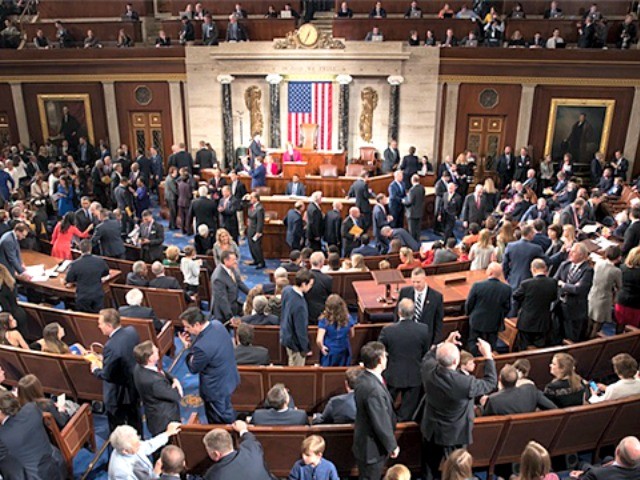House Republicans voted unanimously Tuesday to revoke the Federal Communication’s (FCC) broadband privacy rules, sending legislation to the White House that would undo duplicitous regulation around consumer privacy.
Republicans passed the measure, 215-205, that eliminates regulations set under former FCC chairman Tom Wheeler’s reign over the FCC to block internet service providers from using consumer data.
Internet service providers argued that the rule subjected them to harsher regulations, while social media companies such as Facebook faced lighter regulations. Opponents of the House bill argued that it violated consumers’ right to privacy without their consent.
Congresswoman Blackburn (R-TN) told Breitbart News that the regulations were unnecessary; the Federal Trade Commission (FTC), not the Federal Communications Commission, should regulate consumer privacy. She explained, “I think that people should realize that the FTC is the primary regulator of privacy, not the FCC. They have the history and the expertise to regulate consumer privacy, and having more than one agency regulate the same agency creates abuse and government overreach. Businesses need regulatory clarity in order to properly operate.”
Congresswoman Blackburn also said, “These rules are unnecessary and just another example of big government overreach.”
TechFreedom president Berin Szoka argued, “The FCC’s rules were unwise and unnecessary. The FCC will soon return broadband privacy policing to the Federal Trade Commission, where it belongs, like all online privacy. In the meantime, enacting this CRA will simply mean that the FCC will police broadband privacy case-by-case — just as it had done under Democratic leadership after the FCC’s 2015 Open Internet Order deprived the FTC of its consumer protection power over broadband by reclassifying broadband as a common carrier service.”
Steven Titch, an R Street Institute associate fellow, also argued that former FCC chairman Tom Wheeler abused his authority by regulating consumer privacy. He said, “As much as progressives might wish it, government regulatory agencies cannot simply do what they want. Just because the FCC regulates wide portions of ISP business doesn’t mean it may regulate every portion of ISP business. It is not the FCC’s job to write rules on privacy regulation. That role, by law, falls to the FTC.”
Federal Communications Commission Chairman Ajit Pai commended the House for passing this legislation, saying:
Last year, the Federal Communications Commission pushed through, on a party-line vote, privacy regulations designed to benefit one group of favored companies over another group of disfavored companies. Appropriately, Congress has passed a resolution to reject this approach of picking winners and losers before it takes effect.
It is worth remembering that the FCC’s own overreach created the problem we are facing today. Until 2015, the Federal Trade Commission was protecting consumers very effectively, policing every online company’s privacy practices consistently and initiating numerous enforcement actions. However, two years ago, the FCC stripped the FTC of its authority over Internet service providers. At the time, I strongly opposed usurping the FTC, and the FCC’s struggles to address the privacy issue over the past couple of years (along with its refusal to recognize consumers’ uniform expectation of privacy) has only strengthened that view.
Moving forward, I want the American people to know that the FCC will work with the FTC to ensure that consumers’ online privacy is protected though a consistent and comprehensive framework. In my view, the best way to achieve that result would be to return jurisdiction over broadband providers’ privacy practices to the FTC, with its decades of experience and expertise in this area.
